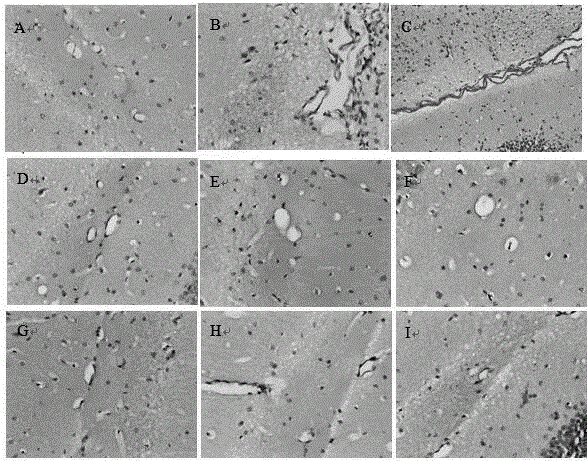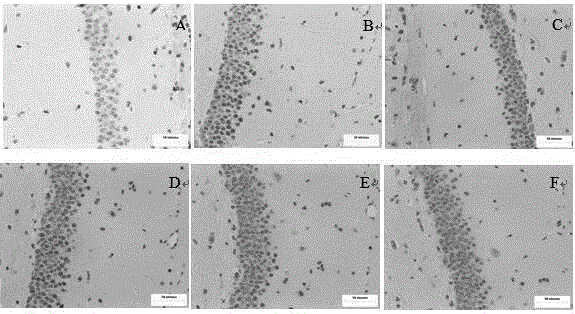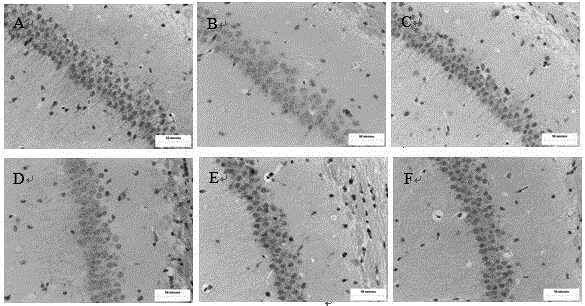Application of astaxanthin and/or lithium chloride in preparation of drugs for preventing and treating cognitive disorder diseases caused by chronic organophosphorus poisoning
A technology for cognitive impairment and astaxanthin, applied in the direction of active ingredients of alkali/alkaline earth metal chlorides, drug combinations, organic active ingredients, etc., can solve problems that endanger human health, achieve inhibition of apoptosis, relieve anxiety and depression, Improving the effect of cognitive impairment
- Summary
- Abstract
- Description
- Claims
- Application Information
AI Technical Summary
Problems solved by technology
Method used
Image
Examples
Embodiment 1
[0027] Example 1. Effects of Astaxanthin Combined with Lithium Chloride Treatment on the Behavior of Chronic Organophosphate Poisoning Cognitive Impairment Mice
[0028] 1) Morris water maze test to evaluate the effect of astaxanthin combined with lithium chloride on the behavior of poisoned mice
[0029] The animal model of chronic organophosphate poisoning was established by subcutaneous injection in mice. After the exposure, the Morris water maze was used to test the memory reproduction and spatial memory ability of the mice. For a total of 6 days, take the average escape latency of the mice in the control group within 5 days as the reference value, and calculate the ratio of the difference between the average escape latency of the model mice for 5 days and the reference value to the average escape latency of the mouse, and the value > 20% consider the model successful, and the model success rate is 90%.
[0030] After the model was successfully prepared, the astaxanthin ...
Embodiment 2
[0052] Example 2. Effect of Astaxanthin Combined with Lithium Chloride Treatment on Histomorphology of Hippocampus in Chronic Organophosphate Poisoning Cognitive Impairment Mice
[0053] 1) Congo red staining to evaluate the effect of astaxanthin combined with lithium chloride on the hippocampal injury of poisoned mice
[0054] The animal model of chronic organophosphate poisoning was established by subcutaneous injection in mice. After 8 weeks of exposure and treatment with various drugs, the skulls were opened to take hippocampal tissue for paraffin sectioning, and Congo red staining was used to evaluate the effect of astaxanthin combined with lithium chloride treatment on hippocampal injury in poisoned mice.
[0055] The result of Congo red staining figure 1 As shown, no orange-red amyloid deposits were found in the hippocampal slices of mice in the control group, and the dorsal cell bands of the hippocampal dentate gyrus were arranged neatly; Obvious striped orange-red d...
Embodiment 3
[0060] Example 3. The effect of astaxanthin combined with lithium chloride treatment on the activation level of Akt / GSK3β / CREB signaling pathway in mice with cognitive impairment in chronic organophosphate poisoning
[0061] 1) Immunohistochemical staining was used to evaluate the effect of astaxanthin combined with lithium chloride on the activation level of Akt / GSK3β / CREB signaling pathway in poisoned mice
[0062] The animal model of chronic organophosphate poisoning was established by subcutaneous injection in mice. After 8 weeks of exposure and treatment with various drugs, the skull was opened to take hippocampal tissue for paraffin sectioning, and immunohistochemical staining was used to evaluate the effect of astaxanthin combined with lithium chloride on the Akt / GSK3β / CREB signal in the exposed mice. Effects on pathway activation levels.
[0063] The results of immunohistochemical staining were as Figure 3-Figure 5 as shown, image 3 The results of p-PI3K immunohis...
PUM
 Login to View More
Login to View More Abstract
Description
Claims
Application Information
 Login to View More
Login to View More - R&D
- Intellectual Property
- Life Sciences
- Materials
- Tech Scout
- Unparalleled Data Quality
- Higher Quality Content
- 60% Fewer Hallucinations
Browse by: Latest US Patents, China's latest patents, Technical Efficacy Thesaurus, Application Domain, Technology Topic, Popular Technical Reports.
© 2025 PatSnap. All rights reserved.Legal|Privacy policy|Modern Slavery Act Transparency Statement|Sitemap|About US| Contact US: help@patsnap.com



